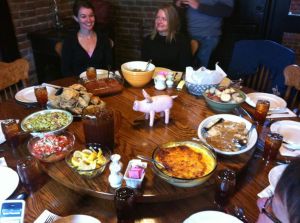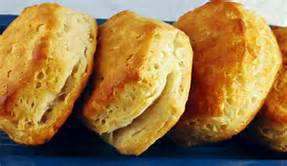America is a strange place to eat. More than one third of us are obese, and nearly one seventh of us go hungry at least part of the time. We have plenty of food, but we don’t share it equitably. We overspend on processed foods that contribute to the diseases that kill us — heart disease, diabetes, and cancer, and we underspend on the foods that would benefit us most — greens, beans, and fish. We value convenience, and with some reason. In order for families to economically survive, most households have both parents working outside the home, so the days of a cook making dinner over a slow flame over hours where the pot was periodically stirred, those days are over for most of us. Therefore, McDonald’s serving us McMuffins all day sounds like a mighty benefit, as lots of us don’t quite get around to breakfast before dinner time.
At odds with this culture of convenience is a strange cult of food, one that creates an audience for cooking as a form of entertainment. We have all-day networks devoted to watching other people cook, and the people who watch are not all watching to imitate. The tradition of American food preparation is that anonymous women did most of the work. Wives prepare Thanksgiving, and the thanks for two days’ cooking goes to God mostly, rarely to the women who burned their wrists taking the turkey out of the oven. Where households could afford to do so, servants were relegated to the kitchen, as kitchens before air-conditioning were miserable places to spend a day during the summer. Big Southern households built kitchens in separate buildings from the big house because the heat was unbearable and with kitchens being the most likely source of a house fire, it made sense to put the kitchen in a free-standing structure that could burn to the ground without burning the home as a whole. The people who sweated, and kneaded, who plucked feathers and gutted fish, those people were not celebrated. In the traditions of the South, they went unpaid, as they were slaves or wives. While wives were not slaves (exactly), they were not free, enfranchised, or able to choose other occupations than that of home maker for the majority of the history of this country and for the entirety of the history of the Confederacy. So why are we watching now the cooks on television who make food into a spectator sport?

“all three of them went up the cat-and-dog-food-breakfast-cereal-macaroni-ri ce-raisins-seasonings-spreads-spaghetti-soft drinks- rackers-and- cookies aisle. ” — John Updike
We seem to have begun the celebration and idealization of cooking as a thing to watch with the industrialization of our food production. After the Second World War, women who had worked for a few years in factory jobs were corralled back into the kitchen to prepare elaborate meals for G.I. husbands who would take their place as industry captains. Meals went from something to grab on the fly to a proof of good housekeeping and feminine skill. Companies selling industrial food products — margarine, corn syrup, and cheese in a can — started having contests for housewives to compete like athletes, and this to promote the factory of food they ran. County fairs had pie contests before, but national contests with television spots for winners — that was a 1950s idea and part of the myth of the happy housewife that would be rendered joyful by soap called Joy, by soup in a can, by floor wax that made a shine in which she could see her happy face reflected. Suddenly, it became possible to make cooking aspirational, part of the American dream. A perfect pie, with meringue peaks just browned lightly — this was now a national source of comfort.
With the exit of women from the kitchen and into the workplace, food changed again.We became increasingly dependent on prepackaged goods, on restaurants that mass-produce food, and we became less healthy than before. We stuffed ourselves mindlessly in front of the television with our potato chips rather than consider eating a discrete episode where family members looked each other in the eye, where fresh ingredients comprised the whole of the meal, where the meal ended, and we did not eat again until the next meal. We became a nation of lonely snackers overly engaged in video games and sports events where we neither lifted a ball nor even donned a jacket to venture out of our living rooms to sit on a bleacher and cheer. We became spectators instead of participants in the leisure of our own lives.
So why do so many of us slouch on couches watching the cooking shows and then drive to eat Big Macs? I attribute it to a longing for authenticity. When the unsung women used to cook us meals the slow way, we took them for granted, but we felt loved. The food smelled like something. Our lives felt like we needed to be awake for them. We talked like connected people to one another around the table. The food nourished us. We were fed. We don’t know when dinner is any more. Nobody has the time to make dinner, not a real dinner. Thirty-minute meals are possible, but they require somebody to invest time in a premeditated trip to the supermarket. No distractions had better arise, no pets had better run away not to be found until the next day No family arguments had better explode, and no demands for additional overtime from overbearing bosses had better get voiced for all of us to make it to the table, for the family cook to get to her post chopping the carrots an hour before meal time.
This problem of authentic food and family time is particularly poignant to Southerners. Momma’s biscuits are a source of nourishment as important as mother’s milk. To eat grandma’s tea cakes is a partial living out of Southern identity. Food served at Southern funerals is a reason for the bereaved to stay alive. The home-cooking of Southern tradition is a way of Southerners knowing precisely who they are. But mothers in Atlanta have no more time than mothers in Chicago to cook a four-course meal by sundown. Women in the South are working just like women in the North. Men in the South have not learned to cook any better (with the exception of the honing of seasonal barbecue skills) than men in the North have. Daughters no longer learn with the same frequency the skills requisite in the heirloom recipes of their family heritage. Those foods are usually all advised too fatty by the doctors, anyway, and who has the time?
One of my friends in the South has a traditional recipe of a thin-layered cake of multiple tiers, and it takes a good day to make it. She is a neurobiologist. She can either concentrate on cake-baking, or she can try to find the root of a cure for ALS. To her, the cake is a pleasure, but it is a distraction. She feeds her experiments’ fruit flies, rather than the initiates at any Junior League. That she can make the family cake, which includes home-made fondant (!) is impressive, but it is hardly the most impressive thing she does — she can clone insect brain cells, something her grandmomma never did. Authenticity and tradition often get trumped in today’s South by forward-thinking and long work hours in double-income homes.
So today, if one goes to Lynchburg, Tennessee, home of the makers of Jack Daniels — and in typing these words, I feel compelled to salute sour mash whiskey and its salutory benefits to those who are ailing from heart-ache and underexposure to tear-jerk Country music ballads — I sigh deeply and try to remember what I was saying. What was it? Oh! If one goes to Lynchburg, Tennessee, one can visit a historically preserved boarding house, something which used to be a fixture in the Southern Landscape before the advent of post-war motel chains. Miss Mary Bo Bo’s boarding house in Lynchburg was particularly known for its good food. She received guests, it seems mostly traveling salesmen (and during the Twenties, bootleg distributors), and she served old-school Southern fare — baked apples, creamy macaroni and cheese, turnip greens wilted in pork fat, fried chicken of the kind that rarely gets made in private homes any more, and a delightful variety of pies. A visit to Mary BoBo’s boarding house means one’s small family sits at a big table with others, and at each table for each meal, a hostess explains like a museum curator the significance of each dish within Southern cooking.

Come to Lynchburg, Tennessee for a curated traditional meal, a historical reenactment of Southern lunch.
Today, the house (which is run by the Jack Daniels corporation in conjunction with its distillery tours) attracts many people from outside the South, and the strategy of this table d’hote is essentially to stage a reenactment of the Southern meal, not unlike a historic reenactment of the Siege of Vicksburg. Nobody down South eats a Mary BoBo-sized meal more than once or twice a month, and even then, nobody cooks all the dishes for such a meal except on the rarest of occasions. The Mary BoBo meal is still eaten after funerals and at church socials, and those events are potluck — each cook does a fraction of the work. Perhaps on an occasion as grand as a family engagement one might see such a meal served. Alas, today’s Southern eaters can neither produce nor consume this level of Southern authenticity alone. Paul Prudhomme is gone to his celestial spice rack. Paula Deen, bless her heart (and I mean that in the most Southern of ways), is on a low-carb diabetic diet if she doesn’t want to risk foot amputation and blindness (apart from blindness to her own racism). The rest of the South is hurrying to get home, but when we get there, the kids are playing Minecraft and whine if you ask them to set the table, even though they will be punished for it. The husband got home and fed the dogs, gave the kids each a bag of raisins and a juice box, and he is on Facebook. The wife lugged in the bag of groceries, set a slab of margarine to bubble in the pan, and she is flouring up the pork chops as fast as she can. She wants to catch her breath — work was hard today, but now the baby has started to cry, and she runs, yells at her husband to watch that nothing burns, and picks up the littlest one to see if he has shoved one of his brother’s toys up his nose again.
Who has time to cook? Who can look a loved one in the eye without wanting to cry? Where is grandmomma’s multi-layered cake, momma’s biscuit, daddy’s barbecued ribs? Is this our current tear-jerk ballad, and do we sing the lyrics of the song together? Or do we sing it in rooms with closed doors, pretending it’s all fine? Where is Miss Mary Bobo, the uncurated one who fed smiling bootleggers and excluded black visitors from her table? We miss her, not for her personality or her moral compass, but for her roasts, the kind that comforted the diner, that said that all was well whether it really was or not. We are sentimental and crave comfort food. Kardashians are tramping around on television. The Internet announces apocalypses, scriptural and zombie. We feel empty inside.
What’s for dinner? What should we really eat for dinner? What will really satisfy us, North and South?






